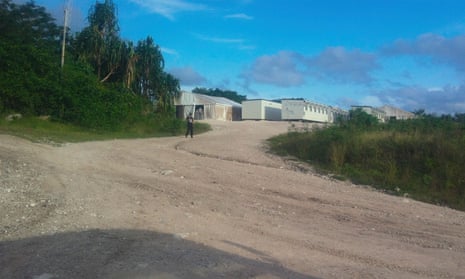The serious neurological, physiological and psychological conditions of an African refugee who became pregnant after being raped on Nauru were not exceptional enough to warrant her being brought to Australia for medical treatment, a senior official within the Department of Immigration and Border Protection has told the federal court.
IHMS, the company contracted by the Australian government to provide medical services to asylum seekers in offshore processing centres, wrote to the official, David Nockels, to say the woman required an urgent abortion.
Five separate medical experts, including neurologists, psychiatrists and general practitioners, advised the government that because the procedure would carry extra complications due to her medical conditions, the procedure should be carried out in Australia.
The government was also advised that it was illegal to have an abortion in Papua New Guinea, with penalties of up to seven years in prison, and that Pacific International hospital and Port Moresby did not have the medical equipment to diagnose her suspected epilepsy, which specialists said would be essential to obtain before subjecting her to surgery.
There was no neurological unit at the hospital should she require monitoring due to complications, the government was advised, and psychiatric support was also inadequate.
The woman, identified only as S99, had been raped after falling unconscious as the result of one of her seizures, and woke to find blood and male discharge on her clothes. This and her subsequent pregnancy had left her with severe post traumatic stress disorder, the advice from IHMS experts said.
Although a medical abortion was initially recommended, a scan revealed her pregnancy was too far along and surgery was the only option.
Nockels told Justice Mordecai Bromberg in his evidence on Friday that the government had a policy not to bring asylum seekers to Australia, even for medical treatment, unless the circumstances were exceptional.
“That’s why we have Nauru and Manus,” Nockels said.
On 26 April, Nockels refused the request from S99 to transfer her to Australia for treatment, saying that a phone call to an obstetrician at the Pacific International hospital, Dr Mathias Sapuri, who had no expertise in neurology, psychiatry or PNG law, had reassured him that the abortion could be carried out in Port Moresby.
In his evidence, Sapuri admitted he had a financial interest in the Pacific International hospital as a shareholder, and that his private obstetric practice merged with the hospital. He did not say what proportion of the shares he held, other than it was “small”.
Ron Merkel QC, representing S99, asked Nockels why he valued the opinion of one doctor with an interest in attracting patients to the hospital over the advice of multiple medical experts provided by IHMS and lawyers representing S99.
“Would you agree maybe you should have thought this is an exceptional case?” Merkel said.
Nockels said that on reconsideration, aspects of s99’s case were “broadly exceptional” but that he stood by his judgment not to bring her to Australia for an abortion.
“I’m confident with his [Supari’s] assurance to me that it was a procedure he could do,” Nockels said.
Nockels did not seek internal legal advice about whether s99 would be exposed to criminal consequences for undergoing an abortion in PNG, but the court heard that advice from the government to IHMS was for IHMS not to concern itself with the legality of the procedure.
Nockels said he did not ask about whether S99 could have been flown to New Zealand or Singapore for the procedure, which have hospitals with the required medical specialists and equipment to treat and monitor S99’s other medical conditions. He did also not discuss her case with the surgeon general of border force, the court heard.
Another option Nockels said he would consider before approving a patient to fly to Australia would be to fly the required experts and medical equipment to the patient.
Merkel replied: “You would fly one EEG unit, an experienced neurologist, a psychiatrist an anaesthetist, as well as the considerable expertise required before and after the operation ... you could fly that whole team over to PNG because this is not an exceptional case?”
“That would be an option,” Nockels said.
Nockels had the authority to change his mind at any time about his decision and fly S99 to Australia for treatment, the court heard.
S99 is in Port Moresby, after signing a form giving consent to the procedure there. However, her lawyers told the court that S99 had not given informed consent, had not understood the forms she was signing, and had been told only that she would be flown to a third country.
An emergency court order was issued upon her arrival in Papua New Guinea to halt the abortion being performed.
Merkel told Nockels: “I’m not criticising you. You’re not the prime minister or immigration minister. But you understood the [government] policy to be to send her anywhere else other than Australia”.
“Correct,” Nockels said.
Bromberg is sitting late on Friday in order to get through all of the evidence so that, given the urgency of the situation, he can fast track his decision.
His decision may come as early as next week, though the government can still change its mind before then.
The case continues.
